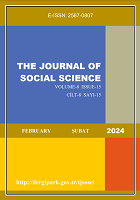Arap Baharıyla Sembolleşen Tahrir Protestolarında İnternetin Rolü: Meydan Sembolü Üzerinden Bir Analiz
The Role of the Internet in Tahrir Protests Symbolized by the Arab Spring: An Analysis on the Square Symbol
Author(s): Gülcennet Öztürk ÇelebiSubject(s): Media studies, Theory of Communication, Social Theory, Sociology of Politics
Published by: Dicle Üniversitesi, Sivil Havacılık Yüksekokulu
Keywords: Arab Spring; Egypt; Tahrir Square; Tunisia; Social Media;
Summary/Abstract: The society, which has a dynamic and multifaceted structure, has accepted to be a part of political systems as 'governed' by delegating its powers to the government. However, this acceptance does not involve an eternal contract. At certain times in world history, a political, military, economic or legal discontent becomes visible with a single spark and turns into movements that characterize themselves as 'resistance, spring, occupation' or simply 'action'. In 2010, the social movements that began with the so-called Arab Spring, which affected many countries, were part of this process. Today, the internet, and therefore social media, plays an important role in the spread of these movements. This is also seen in the Arab Spring, which is considered as one of the 'new' social movements. While the causes and consequences of protests in each country are different, this study focuses on the Egyptian protests affected by the Arab Spring and presents a descriptive analysis of the role of the internet in these protests. The study highlights the importance of the concept of square, exemplifies the Arab Spring process symbolized by Tahrir Square, and emphasizes the importance of social media in informing national and international public opinion during the Tahrir protests. Egypt's geopolitically important position in the region is a factor in both being the subject of the study and being one of the countries most affected by the Arab Spring process.
Journal: The Journal of Social Science
- Issue Year: 8/2024
- Issue No: 15
- Page Range: 46-59
- Page Count: 14
- Language: Turkish

